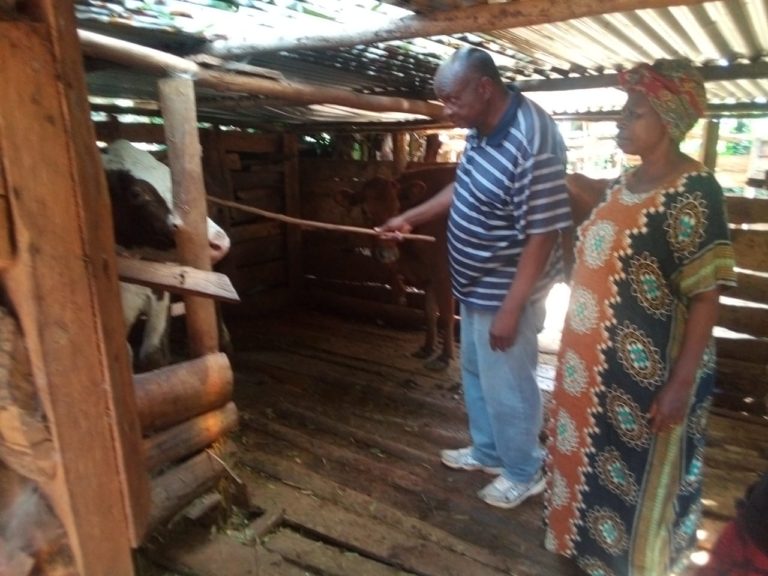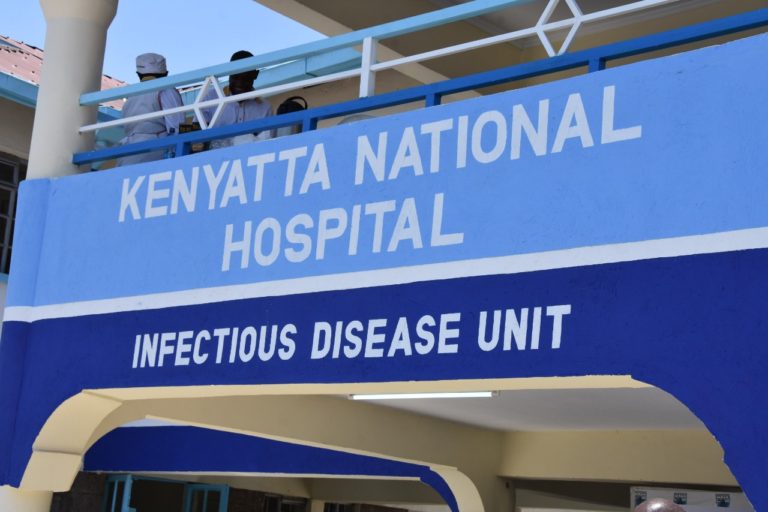KAKAMEGA, KENYA MARCH 21, 2020 — Julius Shilenga Lumwamu struggled 13 months in a series of misdiagnosis beginning June 2006 after discovering a swollen lymph node on his left arm and numbness on small fingers of both his hands.
Then aged 48, and a teacher in one of the local schools in Kakamega, some 390 km north-west of the capital, Nairobi, he would frequent Nairobi to seek medication after exhausting all medical options in his rural district.
“I underwent a series of medical tests, all at my own expenses which involved traveling all the way to Nairobi and back. It was a costly affair, and more painful because I wasted the little money I had without getting to unearth the cause of my sickness,” Lumwamu, 62-year old father of six, who is a cancer survivor tells Ubuntu Times as he attends to his dairy cows in his rural home.
Now a retired teacher, Lumwamu story depicts a sense of hopelessness for millions of citizens living in low and middle-income countries, in which the World Health Organization in its February report dubbed ‘Setting priorities, investing wisely and providing care for all’ predicts a 60 percent increase in cancer cases if the current trend is anything to go by.
“There is a need to step up cancer services in low and middle-income countries. If the current trend on cancer cases continues, the world will witness a 60 percent increase in cancer cases over by 2030,” states the report.
Kenya, like countries in the developing world, has had to focus limited health resources on combating infectious diseases and improving maternal and child health, while health services are not equipped to prevent, diagnose and treat cancers.
According to WHO, the year 2019 saw more than 90 percent of high-income countries reporting that comprehensive treatment services for cancer were available in the public health system compared to less than 15 percent of low-income countries.
Unlike millions of Kenyans who die in silence of cancer, Lumwamu was lucky to access medical help and a financial facility to have him undergo early diagnosis and treatment at the Kenyatta National Hospital (KNH) – Kenya’s oldest and largest public, tertiary referral hospital for the Ministry of Health located in Nairobi.
“It was traumatizing. I was required to part with some 500 USD for manual biopsy, a test in which sample tissue is taken from the body in order to carry out close examination at KNH. I had exhausted a 5,000 USD loaning facility from my teachers SACCO and so became hard to raise the amount,” says Lumwamu, who got help from a family friend who linked him to a private hospital where his biopsy specimen was done.
“Again, I was to take the biopsy specimen to KNH to confirm the type of diagnosis but then again, the facility’s biopsy machine had broken down and so the sample had to be flown to India for further analysis,” he narrates.
What he didn’t know then was that two weeks later, the verified results would prove that he had tested with Non-Hodgkin lymphomas cancer, a cancer that arises from lymphocytes, a kind of white blood cell usually found in blood and lymph nodes.
Sitting in their living room on a quiet village in Kakamega County, Lumwamu and his wife Esther Shimenga said they were so shocked at the results, especially having a loan of 500 USD to repay, with the real treatment cost staring at their stretched financial resources.
“Having received the exact diagnosis, I had to be subjected to chemotherapy treatment twice a month for three months. I now had no other option than approaching a commercial bank for a loan,” Lumwamu, who sourced for a 10,000 USD loan from Equity Bank.

Despite being a subscriber to the National Health Insurance Fund (NHIF), this only helped him pay a bill of a meager $43, against a required $500 for biopsy test at the KNH, the public health facility.
“From what I went through, I don’t think the government has ever known exactly how to go about helping especially people facing life-threatening diseases like cancer. People just die quietly, they suffer because the time they are supposed to get treatment, the drugs are not there and if they are available they are very expensive,” he says, adding that for him, he was forced to buy drugs in the city, far from KNH where he was receiving treatment, which would cost him up to $300.

The International Agency for Research on Cancer (IARC) through its recent report titled ‘Cancer Research for Cancer Prevention’ says high-income countries have adopted prevention, early diagnosis, and screening programs, which together with better treatment, have contributed to an estimated 20 percent reduction in the probability of premature mortality between 2000 and 2015, but low-income countries only saw a reduction of five percent.
“The challenge will be for countries to select treatments balancing considerations including cost, feasibility and effectiveness. Each government is tasked with choosing the appropriate innovative cancer therapies, while recognizing that established treatments, many of which are very effective and affordable, can provide benefits for cancer without causing financial hardship,” says the report.
Each time an affluent Kenyan or a politician succumbs to cancer disease, government operatives are quick to fill airwaves with promises of improving the healthcare system, including policies governing cancer management, but fade into thin air a couple of days.
Dr. Catherine Nyongesa, physician and radiation oncologist, founder and Chief Executive Officer (CEO) of Texas Cancer Centre told Ubuntu Times in an interview that Kenya, compared to years back, has made progress combating cancer.
“Introduction of oncology packages by NHIF since 2016 to cater for treatment be it surgery, chemotherapy and radiotherapy, launching of the National Cancer Control Strategy, formulation of national cancer treatment guidelines 2013, National Cancer Treatment Protocols 2018 and the National Cancer screening guidelines has upped efforts to combat this life-threatening disease,” she said.
In Kenya today, cancer is ranked as the third leading cause of death, exceeded only by infections and heart disease.
The Global Cancer Observatory (GLOBOCAN) 2018 findings show that each year, about 47,887 Kenyans get cancer and 32,987 die from the disease. The most common remains breast cancer with 5,985 women and men diagnosed every year compared to 2,864 prostate cases. Cervical cancer is one of the most common cancers in women, in developing countries, constituting a real public health problem.



















